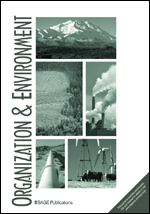The Commodification of Pollution and a Preemptive Double Movement in Environmental Governance
 Matt J. Mariola, College of Wooster, published “The Commodification of Pollution and a Preemptive Double Movement in Environmental Governance: The Case of Water Quality Trading” on September 21st, 2011 in Organization & Environment’s OnlineFirst Collection. Click here to view other OnlineFirst articles.
Matt J. Mariola, College of Wooster, published “The Commodification of Pollution and a Preemptive Double Movement in Environmental Governance: The Case of Water Quality Trading” on September 21st, 2011 in Organization & Environment’s OnlineFirst Collection. Click here to view other OnlineFirst articles.
The Abstract:
The management of environmental pollution has traditionally been accomplished via the regulatory power of the state, but more recently the rise of a new, market-based form of governance has been observed. This article examines the sector of water quality trading, in which caps are placed on surface water pollution and polluters can purchase “offset credits” from farms or other polluters who are under their cap. Using a content analysis of program case studies and federal and state trading rules, the author analyzes this emergent form of environmental governance using an expanded Polanyian framework that he terms the preemptive double movement. Instead of the state reacting to the dangers of a new market form after the fact, here the state uses its existing authority to constrain the market so that further environmental damage does not result. The author describes eight specific regulatory mechanisms that illustrate this preemptive double movement at work.
Follow this link to learn more about Organization & Environment. Are you interested in receiving email alerts whenever a new issue or article becomes available? Then click here.
Happy Halloween!
[polldaddy rating=”4667602″]
































































































